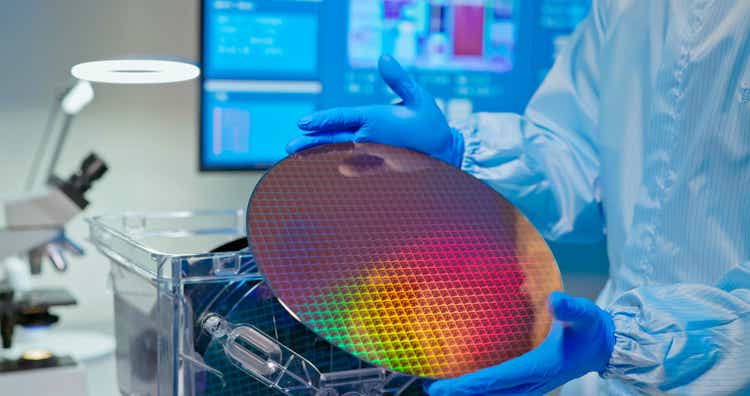PonyWang
Warren Buffett’s Berkshire Hathaway Inc. (BRK.A, BRK.B) recently purchased $4.1 billion worth of shares of Taiwan Semiconductor Manufacturing Company Limited (NYSE:TSM) (“TSMC”), as shown in its Q3 13F filing. While Buffett is not exactly the most tech-savvy investor, and the decision could’ve been made by his top lieutenants Todd Combs and Ted Weschler, Buffett is very well known as a value investor who knows how to spot companies with favorable long-term prospects, strong financials, and an attractive valuation. Let’s go through each of these qualities to understand why TSMC made Berkshire’s buy list.
1. Favorable long-term prospects
TSMC is the world’s largest contract chip manufacturer and commands over 55% of the foundry market. At the leading edge, TSMC is the undisputed leader (competitive analysis here), with an 85% market share in the 7nm process node and 90% in the 5nm process. The most advanced 3nm process is already in volume production in the current quarter, with revenue contribution expected in 2023 (3Q22 earnings analysis here). Should its closest competitor Samsung (OTCPK:SSNLF) continue to struggle with yield issues at the most leading edge, TSMC could virtually have a monopoly in the 3nm process node, where Apple (AAPL) is expected to be the first major customer.
While the industry is currently going through an inventory correction phase where smartphone and PC customers have been cutting orders, TSMC’s technology leadership puts the company in a favorable spot to benefit from the secular trend towards higher silicon content in almost all digital devices, from laptops to server network processors. In 2022, the HPC platform as a percentage of total revenue exceeded the Smartphone platform for the first time in Q1.
Despite Gartner forecasts that the semiconductor industry will contract by 2.5% in 2023, TSMC sees 2023 as a growth year given that HPC is expected to be the major growth driver thanks to applications in AI, 5G, datacenters, smart cars, VR/AR, and connected devices. While the Automotive platform is still early at 5% of TSMC’s revenue, this could potentially become a meaningful growth contributor as automakers embrace more semiconductor chips in the transition towards electric vehicles (“EVs”). All told, digital transformation is here to stay post-Covid, and the demand for higher silicon content and faster computing power remains a structural vs. cyclical tailwind for TSMC.
2. Strong financials
TSMC is an extremely well-managed business with a strong margin profile and a solid balance sheet. As an industry-leader in semiconductor manufacturing, TSMC boasts an average gross margin of 50% over the last 5 years and is expected to deliver GM of 55% in 2022. While management’s longer-term GM target of 53%+ may face some downward pressure in 2023 due to higher N3 depreciation (2-3% impact) and lower N7 capacity utilization amidst inventory adjustments in the consumer electronics market, anywhere above 50% in the current down cycle is highly respectable.
During the 2008 financial crisis, TSMC was able to maintain a very strong margin profile where GM fell just 1.5 points from 44% in 2007 to 42.5% in 2008 and subsequently recovered to 43.7% in 2009 and 49.4% in 2010. On the bottom line, net margin fell from 33.8% in 2007 to 30% in 2008/09, but saw a strong recovery to 38.5% in 2010. While history does not guarantee future results, it should give investors a sense of how TSMC will manage through the next recession.
Turning to the balance sheet, TSMC is by no means an asset-light business considering hard assets (net property, plant & equipment) make up 55% of total assets. While chip manufacturing is a capital-intensive activity where tens of billions must be spent on developing new technology and building new capacity, TSMC has historically maintained a highly liquid balance sheet where cash easily represents over 25% of total asset. The company also exited Q3 with $47 billion in cash and short-term investments against $27 billion in total debt. Needless to say, TSMC is in an extremely strong financial position as the industry enters a downturn.
3. Attractive valuation
Let me start this section by asking how many companies can be the absolute leaders in their respective space, command a 50%+/35%+ gross/net margin, own a fortress balance sheet, yet still trade at a significant discount to peers? The answer is not many, and TSMC certainly belongs to the list. Prior to Berkshire’s disclosure, TSMC was trading at 12x 2023 consensus EPS of $6.00, which is a massive discount to Western semiconductor names like ASML (ASML)/Nvidia (NVDA)/AMD (AMD)/Intel (INTC) at 30x/37x/20x/15x.
What could have explained the discount even against Intel which has been struggling with process leadership and losing market share to AMD? The answer is geopolitics. Taiwan is constantly under military threats from the Chinese Communist Party and the Russia-Ukraine crisis in 2022 has soured the mood for foreign investors in TSMC, which runs the majority of its operations in Taiwan despite having moved some production to Arizona, U.S.
Put simply, the geopolitical discount on the stock was likely what attracted Buffett the most from a valuation standpoint. In an extreme scenario that China invades Taiwan, it’s conceivable that none of the semiconductor companies in the West will be able to sustain their valuation premiums upon losing TSMC as their most important supplier and customer. Should peace continue across the Taiwan Strait, however, value investors like Buffett are set to benefit from a multiple expansion once geopolitical fears fade.
Conclusion
Warren Buffett is famously known for buying companies with favorable long-term prospects, strong profitability, a healthy balance sheet, and an attractive valuation. TSMC deservedly passed all the tests when shares suffered a massive selloff in Q3, and it’s my view that Berkshire Hathaway will be handsomely rewarded once the market gets through the current industry downturn and fears over the geopolitical side of the story.


Be the first to comment